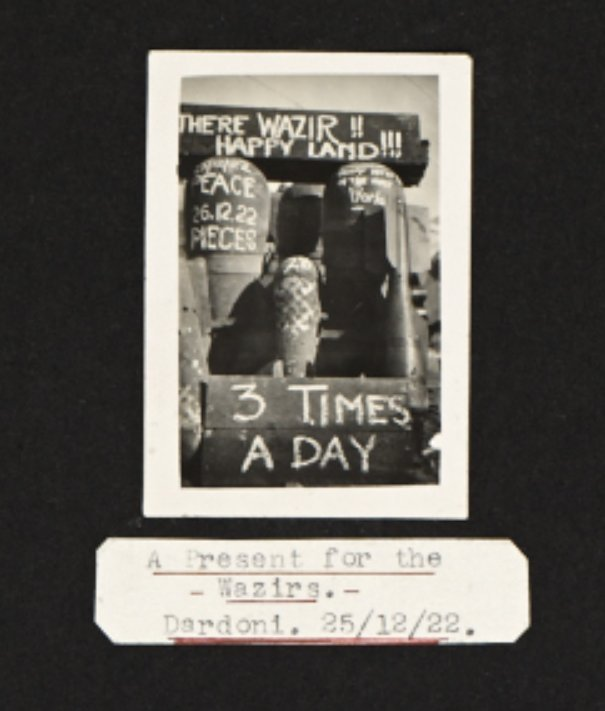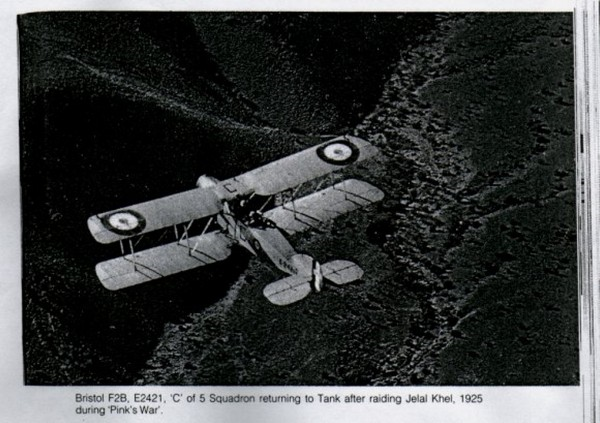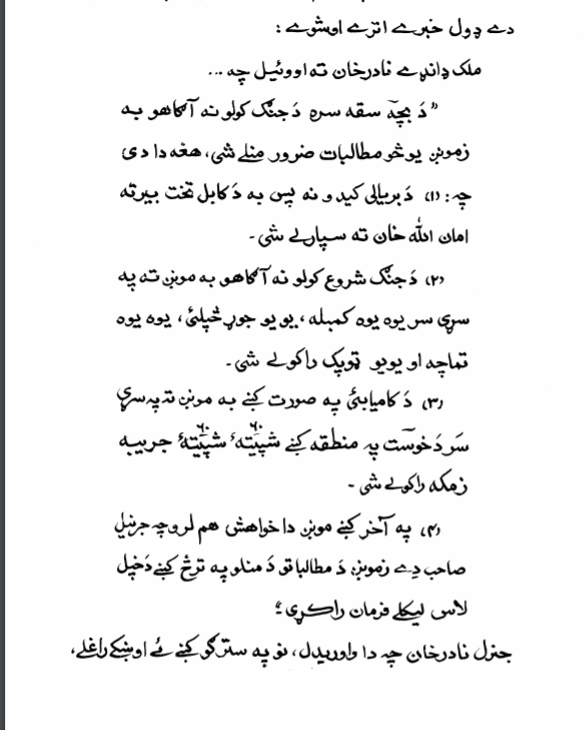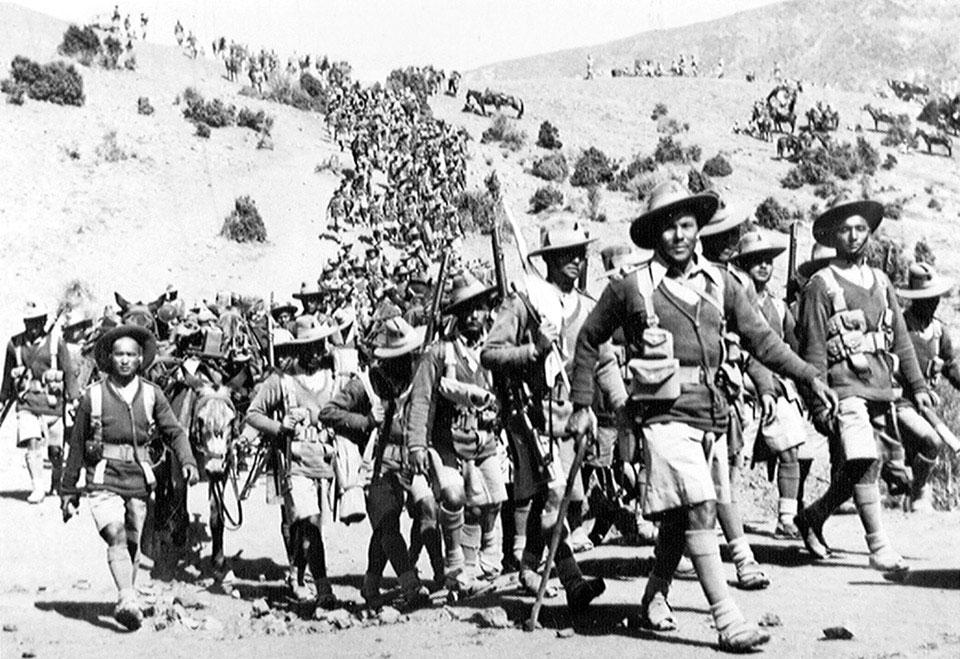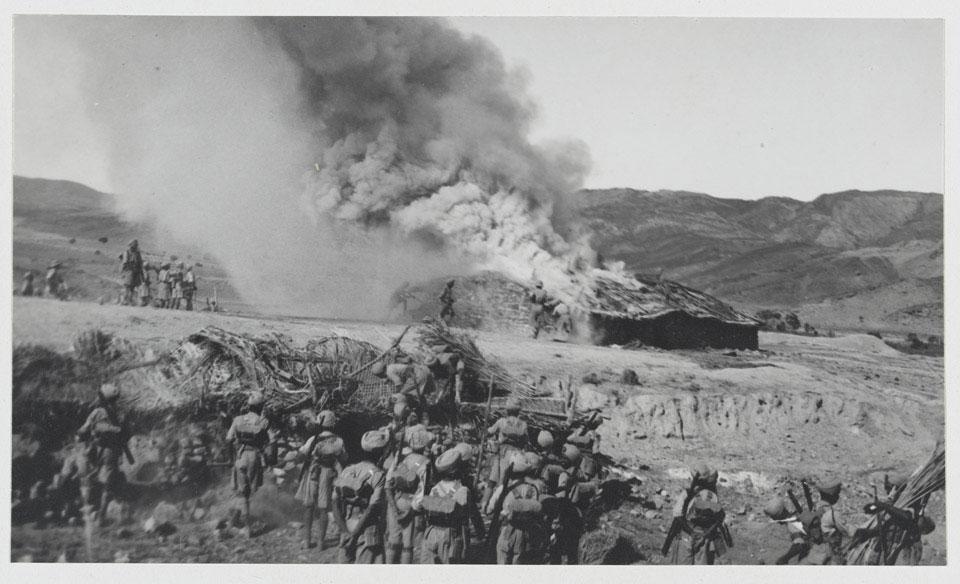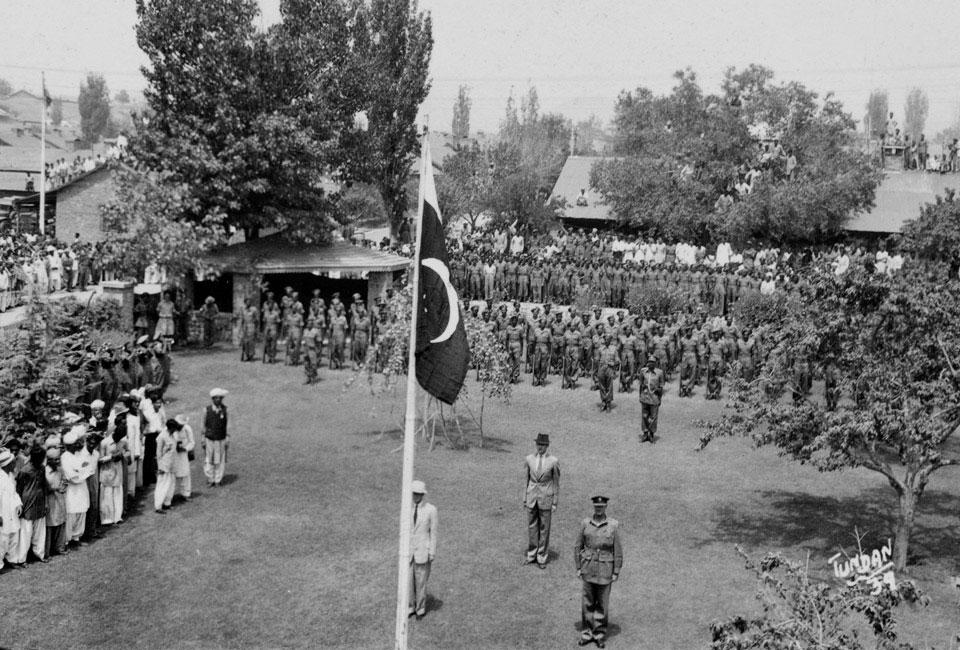Waziristan – Militancy and violence through the last 100 years.
Thread on the military campaigns against, and of the tribesmen of Waziristan.
Thread on the military campaigns against, and of the tribesmen of Waziristan.
3rd Anglo-Afghan War-1919: The Pashtun tribesmen had long been resisting the British-Indian occupation for a few decades on their own. When Amanullah Khan declared war against the British, it was natural for the Pashtun tribesmen to side with Afghanistan against a common enemy.
Amanullah Khan sent General Nader Shah to Khost to launch attacks against the British from the Kurram-Waziristan front. Wazir, Dawar, Mehsud tribes were at the forefronts in attacking military installations, piquets, forts and caravans of the British-Indian army.
Gen. Nader Shah believed that the Pashtun tribes of the borderland were Afghanistan’s “first line of defense”.
He enjoyed support of the Pashtun tribesmen of the Waziristan, and the joint offensives of Gen. Nader Shah and of the tribesmen forced the British to withdraw from many of their military installations from that region.
During the war, many Pashtun tribesmen defected the Afghan brethren and fought alongside them against the British-Indian army. Acc. to one report, there were about 187 attacks in the Waziristan-Kurram area against the British alone.
Soon afterwards, the Afghans & Brits agreed on an armistice & started negotiations. One of the three conditions that Afghanistan placed on the terms of the peace agreement was that tribes would have amnesty from any punitive actions afterwards, but the British rejected it.
Nevertheless, the peace agreement was signed, and with that Afghanistan won complete sovereignty and independence and the very short 3rd Angla-Afghan War came to an end.
British had previously committed to punish the tribes for their role in the war.
“to avoid prejudicing armistice negotiations bombing operations by air against Afghan towns are to be suspended. Continuation of operations against the tribes will not be affected..."
“to avoid prejudicing armistice negotiations bombing operations by air against Afghan towns are to be suspended. Continuation of operations against the tribes will not be affected..."
OTOH, the peace agreement between Afghanistan and British-India had the opposite effect on the Wazirs & Mehsud; they increased their hostilities, as they believed that Waziristan would be transferred to Afghanistan in the coming six months post the peace agreement.
But that wasn& #39;t the case.
Later, king Amanullah Khan invited some tribesmen from Waziristan to Kabul and rewarded them for their role in the war.
Later, king Amanullah Khan invited some tribesmen from Waziristan to Kabul and rewarded them for their role in the war.
Amir Amanullah Khan praised and thanked the tribesmen for their services in his cause and that of Islam.
“He [Amanullah] advised the tribesmen to come to an agreement with the British.”
“He [Amanullah] advised the tribesmen to come to an agreement with the British.”
But there was no agreement bw the tribesmen and British, at least not before a good long fight.
BTW, at one point, the British contemplated to use “chemical weapons” against the tribesmen in those days, details in the sub-thread. https://twitter.com/NafeesRehmanDr/status/1012046108128923648?s=20">https://twitter.com/NafeesReh...
BTW, at one point, the British contemplated to use “chemical weapons” against the tribesmen in those days, details in the sub-thread. https://twitter.com/NafeesRehmanDr/status/1012046108128923648?s=20">https://twitter.com/NafeesReh...
There is indication that “chemical weapons” were eventually used against the pashtun tribes. https://twitter.com/NafeesRehmanDr/status/1039583344776937474?s=20">https://twitter.com/NafeesReh...
Nov, 1919-1924: In the wake participation of the tribesmen in the 3rd Anglo-Afghan war, punitive operations against the tribesmen were sanctioned by the British in early Nov, 1919. Among other measures, RAF was tasked to carry out bombardment of the tribes.
In November 1919 alone, 10,000 lbs (500 KGs~) of bombs were dropped on the villages of the tribesmen.
There has not be a single year without the locals resisting in one or another way despite huge loss to their property, cattle and their lives. At one point, almost all of the population was forced to take refuge in caves in the mountains.
House after house, village after village were bombed, raided, razed, and burnt.
The British had bounded majority of the tribes in terms, some would be offered allowances, others punished but they were never successful in completely subduing the tribesmen of the Waziristan.
The British had bounded majority of the tribes in terms, some would be offered allowances, others punished but they were never successful in completely subduing the tribesmen of the Waziristan.
Khost Rebellion 1923-24: Tribesmen of the Mangal tribe rebelled against the “westernization” of Afghanistan when King Amanullah rolled out new constitution and Nizamnama. These tribesmen would take Nizamnama in one hand and Quran in another and would ask people to choose which
side they were on. Amanullah then ordered to crush the rebellion by force and declared Jehad against them. Some 14, 000/ lives perished in that rebellion where Afghan Air Force was also first time used. Wazir and Mehsud tribes fought alongside king Amanullah to quell the
rebellion. Amanullah had offered excessive concession to these
Here is an earlier thread on the use of Air Force to crush the Khost Rebellion. https://twitter.com/NafeesRehmanDr/status/1075486990022381571?s=20">https://twitter.com/NafeesReh...
Here is an earlier thread on the use of Air Force to crush the Khost Rebellion. https://twitter.com/NafeesRehmanDr/status/1075486990022381571?s=20">https://twitter.com/NafeesReh...
Pink’s war, 1925: Even after five years of punitive actions and raids by the British, they were unable to suppress the tribes there. Abdur Rehman Khel of the Mehsud tribe were still carrying out attacks on the British-Indian army & were resisting the occupation.
The British sanctioned an air bombardment operation against them under the command of Wing. Cdr. R. M. Pink (hence the name Pink’s war).
They bombed the tribes for 50 consecutive days and forced them to accept British governance. No count of the damages and casualties were ever kept of the tribesmen though. The British lost an airplane and two officers in Pink’s war.
I& #39;ll be adding to this thread in the next few days. We have just covered the period bw 1919 & 1925, and there is much more to talk about till we conclude this thread with the War On Terror. As you can already tell, this will be a long thread.
Correction:
On average, about 10,000/lbs (4535 KGs) of bombs were dropped DAILY. https://twitter.com/NafeesRehmanDr/status/1177274534061383686?s=20">https://twitter.com/NafeesReh...
On average, about 10,000/lbs (4535 KGs) of bombs were dropped DAILY. https://twitter.com/NafeesRehmanDr/status/1177274534061383686?s=20">https://twitter.com/NafeesReh...
War against Habibullah Kalakani, 1929: The rebellion against king Amanullah Khan, led by Habibullah Kalkani, forced the king to flee the country into exile. Kalakani reversed all the & #39;reforms& #39; of King Amanullah Khan.
In early 1929, General Nadir Khan decided to return from France to dethrone Habibullah Kalakani. He traveled via Karachi, Lahore, Peshawar and Kurram into Khost, Afghanistan, and appealed to the Pashtun tribesmen to help him in his mission.
Tribesmen knew Gen. Nadir Shah from the war of 1919 as a general and had fought alongside him. So they didn& #39;t hesitate to answer his call; Lashkars of Wazir, Mehsud, Bhittani, and Bannuchis flocked to Khost join his military mission.
This is interesting.
These tribesmen put forth 3 demands to Nadir Shah:
1.That Aman Ullah Khan would be restored on the throne of Kabul after ousting Kalakani.
2.That each fighter of the tribe would get a pistol, rifle, & a blanket before going to Kabul against Kalakani.
These tribesmen put forth 3 demands to Nadir Shah:
1.That Aman Ullah Khan would be restored on the throne of Kabul after ousting Kalakani.
2.That each fighter of the tribe would get a pistol, rifle, & a blanket before going to Kabul against Kalakani.
3.That once Kalakani is ousted, each of the tribesman is to be granted land in Khost.
4.And that Nadir Shah should commit to these demands in writing.
4.And that Nadir Shah should commit to these demands in writing.
Hearing the demands of the tribesmen, Nadir Khan announced to them that he himself was needy and had requested the tribes’s help. And that he would not have begged for their support had he had that much wealth and power.
The tribes vowed to support him unconditionally. Kalakani was defeated and arrested by the end of October 1929 and was executed along with his cabinet members. Nadir Khan assumed the throne himself and treated the Pashtun tribesmen very well.
You may want to read the following thread on the events that unfolded between 1928-1929 at Kabul. https://twitter.com/NafeesRehmanDr/status/1099978149629214720?s=20">https://twitter.com/NafeesReh...
Fakir of Ipi, 1936: This #PashtunHero put to shame the whole British empire and their military might. They tried everything but couldn& #39;t catch or kill him. In response to every such action from the British-Indian army, he would take his revenge on them.
The following methods were tried by British to capture or kill Fakir of Ipi.
1. Carpet bombing of areas that they suspected could be hiding place of him.
2. Infantry of thousands of troops combed the mountains and caves.
3. Offered him free pardon but he rejected it.
1. Carpet bombing of areas that they suspected could be hiding place of him.
2. Infantry of thousands of troops combed the mountains and caves.
3. Offered him free pardon but he rejected it.
4. Recruited a local tribesman as a spy, gave him a specially made time bomb by the RAF that he placed in one cave but this plan also failed.
There was a Shami Mullah (hailing from Syria but he lived in Germany) active in those times, the British struck a deal with him and paid him 25,000 pounds to leave the country.
The British tried this with Fakir of Ipi also, but this Malang refused it. https://twitter.com/NafeesRehmanDr/status/1118220134924075008?s=20">https://twitter.com/NafeesReh...
The British tried this with Fakir of Ipi also, but this Malang refused it. https://twitter.com/NafeesRehmanDr/status/1118220134924075008?s=20">https://twitter.com/NafeesReh...
There were more reasons behind the resistance of Fakir of Ipi but the tipping point when he took arms & asked for Jehad was when he believed that the British-Indian govt was interfering in the religious affairs of the tribes.
The case in question https://abs.twimg.com/emoji/v2/... draggable="false" alt="👇" title="Rückhand Zeigefinger nach unten" aria-label="Emoji: Rückhand Zeigefinger nach unten"> https://twitter.com/NafeesRehmanDr/status/1095318610468319232?s=20">https://twitter.com/NafeesReh...
https://abs.twimg.com/emoji/v2/... draggable="false" alt="👇" title="Rückhand Zeigefinger nach unten" aria-label="Emoji: Rückhand Zeigefinger nach unten"> https://twitter.com/NafeesRehmanDr/status/1095318610468319232?s=20">https://twitter.com/NafeesReh...
The case in question
Attacks and counter attacks went on till the partition of India. The first 4-5 years were the most violent ones with 00s soldiers were killed, but since Fakir of Ipi was waging a guerrilla war ,the British were never able to stop, catch or kill him.
About 60,000/ British Indian troops took part in the operations against the Fakir of Ipi and his 4,000~ followers.
Photo Source:
https://collection.nam.ac.uk/detail.php?acc=1953-10-63-42">https://collection.nam.ac.uk/detail.ph...
Photo Source:
https://collection.nam.ac.uk/detail.php?acc=1953-10-63-42">https://collection.nam.ac.uk/detail.ph...
Partition of India, 1947: As said earlier also, there had never been complete calm/peace in Waziristan. I& #39;ve just mentioned the important events that took place there.
We fast-forward to 1947-partition of India.
https://collection.nam.ac.uk/detail.php?acc=2006-09-9-257">https://collection.nam.ac.uk/detail.ph...
We fast-forward to 1947-partition of India.
https://collection.nam.ac.uk/detail.php?acc=2006-09-9-257">https://collection.nam.ac.uk/detail.ph...
Dec, 1947: Pakistan had decided to withdraw army troops from Waziristan. The withdrawal operation was code named Curzon & was headed by Maj. Gen. Mian Hayaud Din of Bannu.
(When did Pakistan resend its army into Waziristan?)
(When did Pakistan resend its army into Waziristan?)
https://twitter.com/NafeesRehmanDr/status/1179723628130324480?s=20">https://twitter.com/NafeesReh...
https://twitter.com/NafeesRehmanDr/status/1180903267477397504?s=20">https://twitter.com/NafeesReh...
Afghan-Soviet War 1979 – 1989: https://twitter.com/NafeesRehmanDr/status/1180928981836730376?s=20">https://twitter.com/NafeesReh...

 Read on Twitter
Read on Twitter




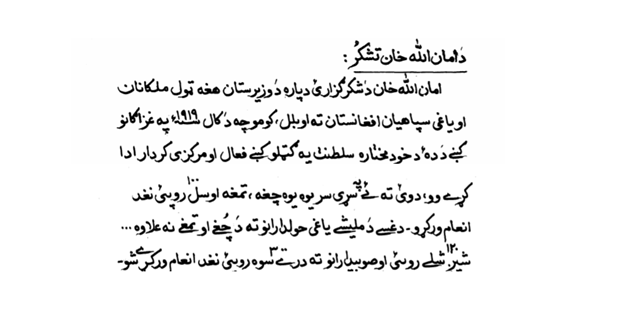
![Amir Amanullah Khan praised and thanked the tribesmen for their services in his cause and that of Islam. “He [Amanullah] advised the tribesmen to come to an agreement with the British.” Amir Amanullah Khan praised and thanked the tribesmen for their services in his cause and that of Islam. “He [Amanullah] advised the tribesmen to come to an agreement with the British.”](https://pbs.twimg.com/media/EFaDdOeXYAcswxN.png)
